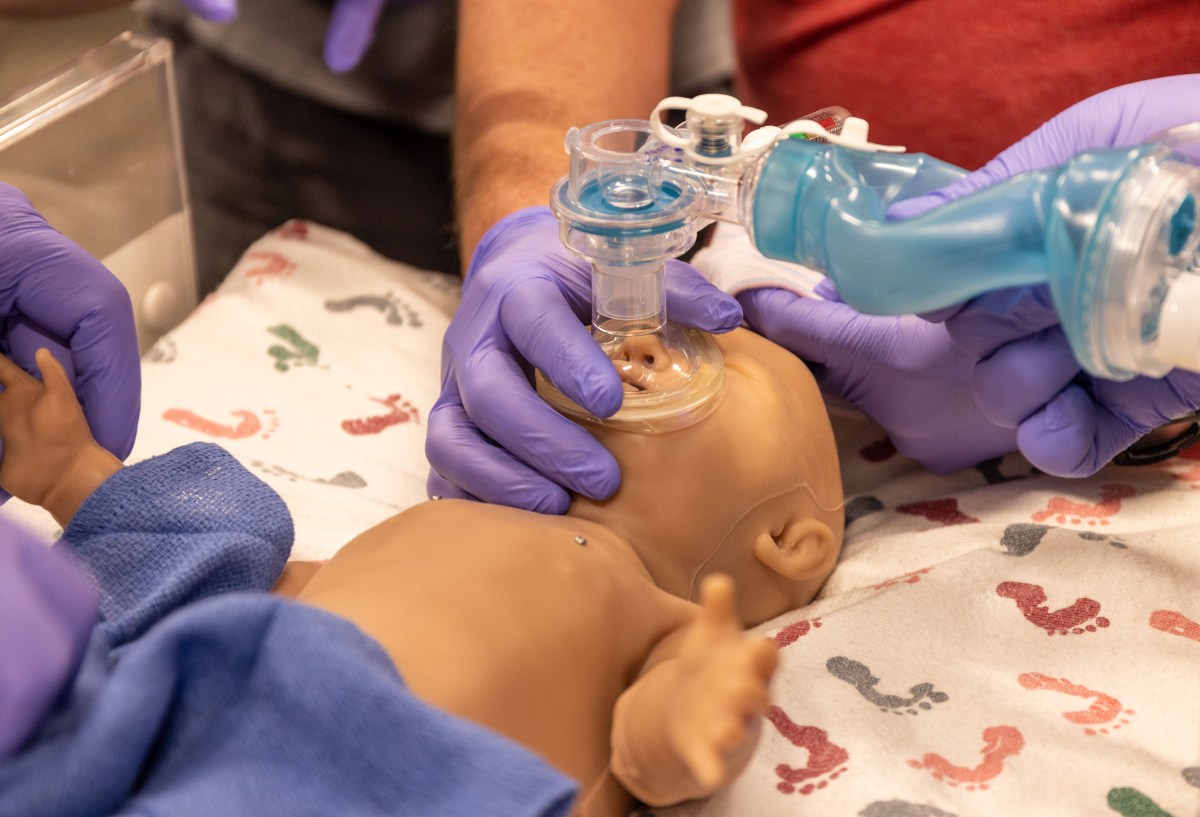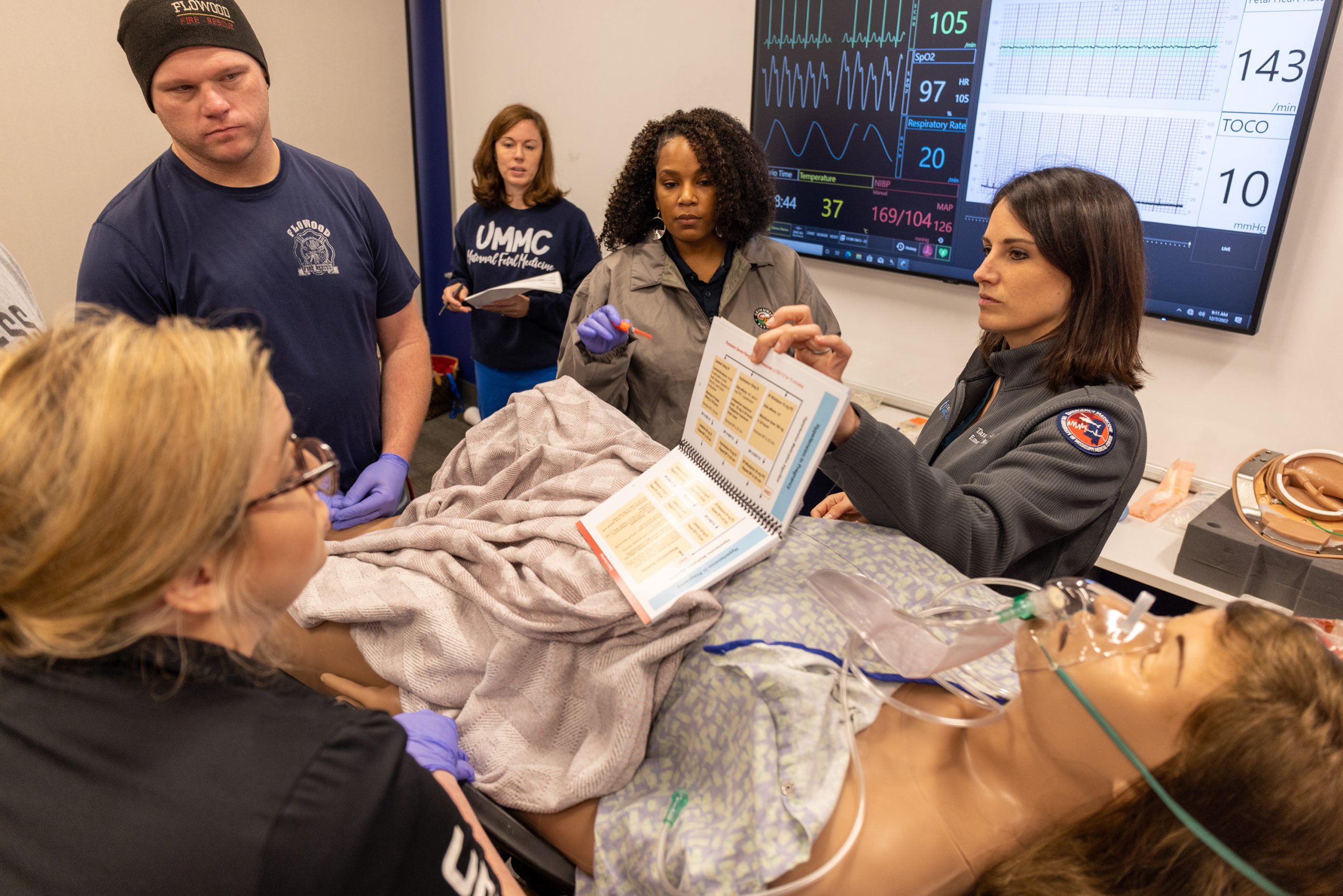Mississippi Today
Mississippi moms and babies are dying. This training teaches first responders how to save their lives.
Mississippi moms and babies are dying. This training teaches first responders how to save their lives.
Matt Greer of Brookhaven was driving home from his shift at the Mississippi Center for Emergency Services, where he works as a flight nurse, when he got a call from his younger sister. A few days earlier, she had given birth to a healthy baby girl after an uncomplicated pregnancy. Now, she told him she had a headache.
He asked her to check her blood pressure: 140/90.
For most patients, that reading isn’t concerning. For a pregnant or postpartum woman, however, it’s an indication of preeclampsia. Greer told her to go to the hospital and eventually she did, getting treatment to prevent seizure and stroke.
But Greer thinks things might have gone very differently had he not completed a new training run by the Mississippi Center for Emergency Services just a few weeks before his sister called.
The STORK Program equips first responders and medical professionals without specialized obstetrics training – including emergency room doctors and nurses – to handle pregnancy and delivery complications like hypertension and hemorrhage. Doctors at the University of Mississippi Medical Center recognized that in a rural state with dwindling options for obstetrical care, women are likely to deliver outside of dedicated labor and delivery wards, and to need care from people who don’t see pregnant patients every day. So they created the STORK training.
Greer has years of experience as a nurse, and his sister is a nurse, too. But without STORK, he would not have known how to interpret her blood pressure reading.
“I would have blown it off,” he said. “Without that fresh on my mind … I would have said, ‘that’s not too bad. You’ll be alright.’”
Chronic health conditions like obesity and diabetes plus poor access to prenatal care contribute to Mississippi’s worst-in-the-nation outcomes for moms and babies, and can’t be treated during a single interaction with a health care provider. But potentially lethal hypertension and hemorrhage are not complicated to manage – if a provider knows what to watch for and what to do.
And even inside hospitals, that can be a big “if.”
“Obstetrics is most people’s kryptonite,” said Dr. Rachael Morris, associate professor of maternal fetal medicine at UMMC, who created and leads the training. “Unless you’re an obstetrician, even a well-trained E.R. physician or mid-level provider is going to tell you that you bring a pregnant lady into my E.R., and everyone’s going to freak out.”
The STORK Program’s half-day training includes lectures and simulations to change that dynamic. (STORK stands for Stabilizing OB and Neonatal Patients, Training for OB/Neonatal Emergencies, Outcome Improvements, Resource Sharing, and Kind Care for Vulnerable Families.) The training is funded with a grant from the W.K. Kellogg Foundation, which also allows participants to receive a bag of supplies they can use during deliveries. The program is run by MCES, a division of UMMC that houses critical care transport services – including helicopter teams – and the state’s communications system for hospitals and first responders, Mississippi MED-COM.
“In Mississippi, infant and maternal mortality rates for people of color are among the highest in the nation and many families have to travel considerable distance to access care, creating obstetric emergencies,” said Wesley Prater, Kellogg Foundation program officer. “Our support of UMMC ensures providers across the state have the proper training to stabilize mothers and babies who need critical care.”
So far, about 150 people from around the state – a mix of registered nurses, physicians, medical residents, firefighters and paramedics – have completed the training over 11 classes since it launched in June. The team has 18 more trainings on the calendar.
With the state likely to tally an additional 5,000 births annually thanks to the abortion ban that took effect in July, obstetric services in the state are actually shrinking. The labor and delivery ward at Greenwood-Leflore Hospital closed in the fall. The Delta lost its only neonatal intensive care unit this summer. The NICU at Merit Health Central, which serves predominantly Black and low-income Jackson neighborhoods, also closed.
Already, more than half of the state’s counties are maternity care deserts: No labor and delivery ward. No OB-GYNs. No certified nurse midwives.
Women in rural areas face long drives to the nearest labor and delivery ward. Sometimes, that means they can’t make it there at all. Instead, they may give birth in an emergency room, at home while waiting for first responders to show up, or on the side of the road.
The STORK program staff hope training participants will be able to handle those situations effectively, saving lives along the way.
“These patients are going to be coming into really small hospitals and delivering or having problems,” said Dr. Tara Lewis, assistant professor of emergency medicine at UMMC and a former labor and delivery nurse.
Lewis joined the program to help tailor it to the needs of emergency room staff in small, rural hospitals.
“If providers don’t know how to make the diagnosis of what problem is going on, then they’re not going to know how to take care of them.”
PHOTOS: First responders trained on how to deliver babies
“You look like a really good uterus,” Morris told a burly Flowood firefighter and paramedic who had joined three of his colleagues to attend a STORK training at MCES on a recent Wednesday morning.
She had just given a presentation on managing hypertension and hemorrhage, and now it was time to demonstrate how to assist during a delivery.
The paramedic held a rubber baby as Morris demonstrated how a baby’s head will generally turn to one side as it leaves the birth canal, and how to use a finger to gently loosen the umbilical cord if it has looped around the neck.
In addition to the Flowood firefighters, attendees included a pediatric emergency room nurse at UMMC, a women’s health nurse in Meridian, and an emergency room nurse at Magee General Hospital who has assisted with three deliveries in the last year alone.
“That’s a lot considering it’s a small hospital with no labor and delivery resources,” she said.
There are regular STORK trainings at MCES open to people from all over the state. But the free training is also conducted at hospitals, so participants don’t have to travel and can see how to apply what they learn where they work.
After Morris finished her presentation, Emily Wells, a nurse practitioner and member of UMMC’s neonate transport team, explained how to care for newborns in the moments after birth. Since Jan. 1 of this year, the team has transported 390 babies to higher levels of care, and participated in 20 emergency room deliveries.
She described the recent delivery of a “rest stop baby,” who was born in a Toyota Camry en route to a hospital during a cold snap.
“Cold babies die,” she said, so the team had cranked up the heat inside the car and done everything they could to keep the baby warm.
In a hospital, the baby would be placed in an incubator. But in a pinch, any kind of plastic bag – maybe one that had been used to hold supplies now in use – could be placed around the baby’s body to conserve heat.

A woman had just delivered a baby at 26 weeks in her car, and now both had made it to the emergency room of their small-town hospital. She had delivered the placenta, too, but was still bleeding.
What should happen next? Half of the training participants gathered around their patient – a life-size mannequin lying on a hospital bed shouting “I’m bleeding” – and discussed what to do.
“At 26 weeks, I think the placenta abrupted,” Morris explained.
Blood trickled from the mannequin’s vagina, soaking a pad underneath her body. This was an important lesson, Leslie Cannon, now an educator with STORK after 25 years as a labor and delivery nurse, pointed out: In patients who aren’t pregnant, life-threatening hemorrhage often looks like a dramatic gush.
“Hemorrhage postpartum, it’s this trickle,” she said. “It’s a huge deal, because that trickle just keeps going.”
That’s important to keep in mind especially because it’s often not obvious when a woman is at serious risk because of bleeding.
“A young, healthy pregnant lady is going to look really good — until she’s about dead,” Morris had warned of hemorrhaging patients.
The students administered tranexamic acid to slow the bleeding.
As Morris had explained during her lecture, a student reached an arm into the uterus to sweep for pieces of retained placenta, which can cause life-threatening bleeding. (“It’s not a comfortable thing to do,” Morris warned.) Another student massaged the mannequin’s belly to cause the uterus to contract.
Eventually, the trickle slowed and stopped. Morris estimated the patient had lost a liter of blood.
Before everyone left, Morris and Wells gave out their cell phone numbers. Kace Ragan, project manager for STORK, explained that participants get supply bags that include QR codes they can scan to request refills — as long as the grant funding holds out — and report their experiences during deliveries.
Morris urged the attendees to text or call her with questions any time. Morris treats some of the most challenging pregnancies in the state and serves as obstetric COVID director at UMMC, meaning she’s spent the last two years witnessing devastating loss.
And yet, she told the training participants, she has “the luxury” of working in a hospital with plenty of resources and specialized training.
“Y’all are in the trenches doing things that I have to do, too, but with so much less,” she said.
This article first appeared on Mississippi Today and is republished here under a Creative Commons license.
Mississippi Today
Hospitals see danger in Medicaid spending cuts
Mississippi hospitals could lose up to $1 billion over the next decade under the sweeping, multitrillion-dollar tax and policy bill President Donald Trump signed into law last week, according to leaders at the Mississippi Hospital Association.
The leaders say the cuts could force some already-struggling rural hospitals to reduce services or close their doors.
The law includes the largest reduction in federal health and social safety net programs in history. It passed 218-214, with all Democrats voting against the measure and all but five Republicans voting for it.
In the short term, these cuts will make health care less accessible to poor Mississippians by making the eligibility requirements for Medicaid insurance stiffer, likely increasing people’s medical debt.
In the long run, the cuts could lead to worsening chronic health conditions such as diabetes and obesity for which Mississippi already leads the nation, and making private insurance more expensive for many people, experts say.
“We’ve got about a billion dollars that are potentially hanging in the balance over the next 10 years,” Mississippi Hospital Association President Richard Roberson said Wednesday during a panel discussion at his organization’s headquarters.
“If folks were being honest, the entire system depends on those rural hospitals,” he said.
Mississippi’s uninsured population could increase by 160,000 people as a combined result of the new law and the expiration of Biden-era enhanced subsidies that made marketplace insurance affordable – and which Trump is not expected to renew – according to KFF, a health policy research group.
That could make things even worse for those who are left on the marketplace plans.
“Younger, healthier people are going to leave the risk pool, and that’s going to mean it’s more expensive to insure the patients that remain,” said Lucy Dagneau, senior director of state and local campaigns at the American Cancer Society.
Among the biggest changes facing Medicaid-eligible patients are stiffer eligibility requirements, including proof of work. The new law requires able-bodied adults ages 19 to 64 to work, do community service or attend an educational program at least 80 hours a month to qualify for, or keep, Medicaid coverage and federal food aid.
Opponents say qualified recipients could be stripped of benefits if they lose a job or fail to complete paperwork attesting to their time commitment.
Georgia became the case study for work requirements with a program called Pathways to Coverage, which was touted as a conservative alternative to Medicaid expansion.
Ironically, the 54-year-old mechanic chosen by Georgia Gov. Brian Kemp to be the face of the program got so fed up with the work requirements he went from praising the program on television to saying “I’m done with it” after his benefits were allegedly cancelled twice due to red tape.
Roberson sent several letters to Mississippi’s congressional members in weeks leading up to the final vote on the sweeping federal legislation, sounding the alarm on what it would mean for hospitals and patients.
Among Roberson’s chief concerns is a change in the mechanism called state directed payments, which allows states to beef up Medicaid reimbursement rates – typically the lowest among insurance payors. The new law will reduce those enhanced rates to nearly as low as the Medicare rate, costing the state at least $500 million and putting rural hospitals in a bind, Roberson told Mississippi Today.
That change will happen over 10 years starting in 2028. That, in conjunction with the new law’s one-time payment program called the Rural Health Care Fund, means if the next few years look normal, it doesn’t mean Mississippi is safe, stakeholders warn.
“We’re going to have a sort of deceiving situation in Mississippi where we look a little flush with cash with the rural fund and the state directed payments in 2027 and 2028, and then all of a sudden our state directed payments start going down and that fund ends and then we’re going to start dipping,” said Leah Rupp Smith, vice president for policy and advocacy at the Mississippi Hospital Association.

Even with that buffer time, immediate changes are on the horizon for health care in Mississippi because of fear and uncertainty around ever-changing rules.
“Hospitals can’t budget when we have these one-off programs that start and stop and the rules change – and there’s a cost to administering a program like this,” Smith said.
Since hospitals are major employers – and they also provide a sense of safety for incoming businesses – their closure, especially in rural areas, affects not just patients but local economies and communities.
U.S. Rep. Bennie Thompson is the only Democrat in Mississippi’s congressional delegation. He voted against the bill, while the state’s two Republican senators and three Republican House members voted for it. Thompson said in a statement that the new law does not bode well for the Delta, one of the poorest regions in the U.S.
“For my district, this means closed hospitals, nursing homes, families struggling to afford groceries, and educational opportunities deferred,” Thompson said. “Republicans’ priorities are very simple: tax cuts for (the) wealthy and nothing for the people who make this country work.”
While still colloquially referred to as the One Big Beautiful Bill Act, the name was changed by Democrats invoking a maneuver that has been used by lawmakers in both chambers to oppose a bill on principle.
“Democrats are forcing Republicans to delete their farcical bill name,” Senate Democratic Leader Charles Schumer of New York said in a statement. “Nothing about this bill is beautiful — it’s a betrayal to American families and it’s undeserving of such a stupid name.”
The law is expected to add at least $3.3 trillion to the nation’s debt over the next 10 years, according to the most recent estimate from the Congressional Budget Office.
This article first appeared on Mississippi Today and is republished here under a Creative Commons Attribution-NoDerivatives 4.0 International License.
The post Hospitals see danger in Medicaid spending cuts appeared first on mississippitoday.org
Note: The following A.I. based commentary is not part of the original article, reproduced above, but is offered in the hopes that it will promote greater media literacy and critical thinking, by making any potential bias more visible to the reader –Staff Editor.
Political Bias Rating: Center-Left
This article reports on the negative impacts of a major federal tax and policy bill on Medicaid funding and rural hospitals in Mississippi. While it presents factual details and statements from stakeholders, the tone and framing emphasize the harmful consequences for vulnerable populations and health care access, aligning with concerns typically raised by center-left perspectives. The article highlights opposition by Democrats and critiques the bill’s priorities, particularly its effect on poor and rural communities, suggesting sympathy toward social safety net preservation. However, it maintains mostly factual reporting without overt partisan language, resulting in a moderate center-left bias.
Crooked Letter Sports Podcast
Podcast: The Mississippi Sports Hall of Fame Class of ’25
The MSHOF will induct eight new members on Aug 2. Rick Cleveland has covered them all and he and son Tyler talk about what makes them all special.
Stream all episodes here.
This article first appeared on Mississippi Today and is republished here under a Creative Commons Attribution-NoDerivatives 4.0 International License.
The post Podcast: The Mississippi Sports Hall of Fame Class of '25 appeared first on mississippitoday.org
Mississippi Today
‘You’re not going to be able to do that anymore’: Jackson police chief visits food kitchen to discuss new public sleeping, panhandling laws
Diners turned watchful eyes to the stage as Jackson Police Chief Joseph Wade took to the podium. He visited Stewpot Community Services during its daily free lunch hour Thursday to discuss new state laws, which took effect two days earlier, targeting Mississippians experiencing homelessness.
“I understand that you are going through some hard times right now. That’s why I’m here,” Wade said to the crowd. “I felt it was important to come out here and speak with you directly.”
Wade laid out the three bills that passed earlier this year: House Bill 1197, the “Safe Solicitation Act,” HB 1200, the “Real Property Owners Protection Act” and HB 1203, a bill that prohibits camping on public property.
“Sleeping and laying in public places, you’re not going to be able to do that anymore,” he said. “There’s a law that has been passed that you can’t just set up encampments on public or private properties where it’s a public nuisance, it’s a problem.”
The “Real Property Owners Protection Act,” authored by Rep. Brent Powell, R-Brandon, is a bill that expedites the process of removing squatters. The “Safe Solicitation Act,” authored by Rep. Shanda Yates, I-Jackson, requires a permit for panhandling and allows people to be charged with a misdemeanor if they violate this law. The offense is punishable by a fine not to exceed $300 and an offender could face up to six months in jail. Wade said he’s currently working with his legal department to determine the best strategy for creating and issuing permits.
“We’re going to navigate these legal challenges, get some interpretations, not only from our legal department, but the Attorney General’s office to ensure that we are doing it legally and lawfully, because I understand that these are citizens,” he said. “I understand that they deserve to be treated with respect, and I understand that we are going to do this without violating their constitutional rights.”
Wade said the Jackson Police Department is steadily fielding reports of squatters in abandoned properties and the law change gives officers new power to remove them more quickly. The added challenge? Figuring out what to do with a person’s belongings.
“These people are carrying around what they own, but we are not a repository for all of their stuff,” he said. “So, when we make that arrest, we’ve got to have a strategic plan as to what we do with their stuff.”
Wade said there needs to be a deeper conversation around the issues that lead someone to becoming homeless.
“A lot of people that we’re running across that are homeless are also suffering from medical conditions, mental health issues, and they’re also suffering from drug addiction and substance abuse. We’ve got to have a strategic approach, but we also can’t log jam our jail down in Raymond,” Wade said.
He estimates that more than 800 people are currently incarcerated at the Raymond Detention Center, and any increase could strain the system as the laws continue to be enforced.
“I think there’s layers that we have to work through, there’s hurdles that we are going to overcome, but we’ve got to make sure that we do it and make sure that my team and JPD is consistent in how we enforce these laws,” Wade said.
Diners applauded Wade after he spoke, in between bites of fried chicken, salad, corn and 4th of July-themed packaged cakes. Wade offered to answer questions, but no one asked any.
Rev. Jill Buckley, executive director of Stewpot, said that the legislation is a good tool to address issues around homelessness and community needs. She doesn’t want to see people who are homeless be criminalized, but she also wants communities to be safe.
“I support people’s right to self determine, and we can’t impose our choices on other people, but there are some cases in which that impinges on community safety, and so to the extent that anyone who is camping or panhandling or squatting and is a danger to themselves and others, of course, I fully support that kind of law. I don’t support homelessness being criminalized as such,” Buckley said.

Many of the people Wade addressed while they ate Thursday said they have housing, don’t panhandle, and shouldn’t be directly impacted by the legislation. But Marcus Willis, 42, said it would make more sense if elected officials wanted to combat the negative impacts of homelessness that they help more people secure employment.
“There ain’t enough jobs,” said Willis, who was having lunch with his girlfriend Amber Ivy.
The two live in an apartment together nearby on Capitol Street, where Ivy landed after her mother, whom Ivy had been living with, suffered a stroke and lost the property. Similarly, Willis started coming to eat at Stewpot after his grandmother, whose house he used to visit for lunch, passed away.
Willis holds odd jobs – cutting grass, home and auto repair – so the income is inconsistent, and every opportunity for stable employment he said he’s found is outside of Jackson in the suburbs. The couple doesn’t have a car.
Making rent every month usually depends on their ability to find someone to help chip in, said Ivy, who is in recovery from substance abuse. She said she’s watched problems surrounding homelessness grow over the years in Jackson. Ivy grew up near Stewpot and has lived in various neighborhoods across the city – except for the times she moved out of state when things got too rough.
“There was just moments where I just had to leave,” Ivy said. “Sometimes if you hit a slump here, there’s almost no way for you to get out of it.”
This article first appeared on Mississippi Today and is republished here under a Creative Commons Attribution-NoDerivatives 4.0 International License.
The post 'You're not going to be able to do that anymore': Jackson police chief visits food kitchen to discuss new public sleeping, panhandling laws appeared first on mississippitoday.org
Note: The following A.I. based commentary is not part of the original article, reproduced above, but is offered in the hopes that it will promote greater media literacy and critical thinking, by making any potential bias more visible to the reader –Staff Editor.
Political Bias Rating: Center-Right
This article primarily reports on new laws in Jackson, Mississippi, targeting public sleeping, panhandling, and squatting, focusing on statements by Police Chief Joseph Wade and community perspectives. The coverage presents the legislative measures—authored by Republican and independent lawmakers—with a tone that emphasizes law enforcement challenges and community safety, reflecting a conservative approach to homelessness as a public order issue. While it includes voices concerned about criminalization and the need for social support, the overall framing centers on law enforcement and property protection. The article maintains factual reporting without overt editorializing but leans slightly toward a center-right perspective by highlighting legal enforcement as a solution.
-
News from the South - Arkansas News Feed7 days ago
Real-life Uncle Sam's descendants live in Arkansas
-
News from the South - Georgia News Feed6 days ago
'Big Beautiful Bill' already felt at Georgia state parks | FOX 5 News
-
News from the South - Oklahoma News Feed6 days ago
LOFT report uncovers what led to multi-million dollar budget shortfall
-
The Center Square4 days ago
Here are the violent criminals Judge Murphy tried to block from deportation | Massachusetts
-
Local News6 days ago
Maroon Tide football duo commits to two different SEC Teams!
-
The Center Square6 days ago
Alcohol limits at odds in upcoming dietary guidelines | National
-
Mississippi News Video7 days ago
Today’s First Alert Weather Kid is Ashlyn (7/4)
-
News from the South - South Carolina News Feed7 days ago
South Carolina lawmakers react as House approves Trump’s sweeping economic package


















































